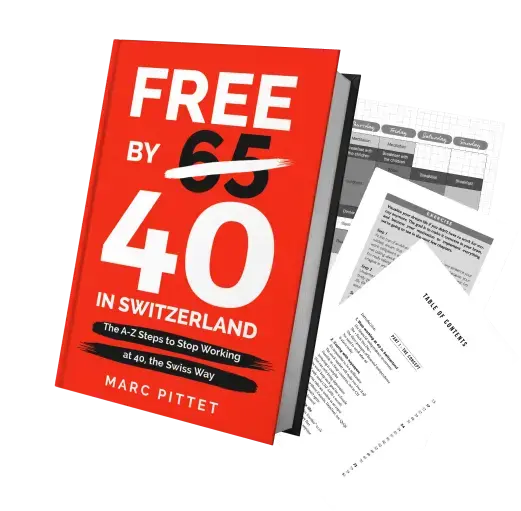How do you manage your finances without a joint bank account in Switzerland with Mrs. MP?!"
I get this question from many readers. Indeed, Zak and other Swiss neo-banks do not provide joint accounts for couples in Switzerland yet.
My answer is still the same to this day: this is not a problem for us, as we use the YNAB budget app to manage our finances as a couple — and this, regardless of how many Swiss bank accounts we have, joint or not.
So we only have one main Swiss bank account with Zak, in one of our names.
The most useful feature of Zak that we use is their Pots system, which makes it very easy to reconcile our Swiss bank account transactions with our YNAB budget — see my video about it below.
Concretely, all the money we receive goes into a default pot. And once the transaction is entered into YNAB, we transfer it to our pot called “YNAB” in the Zak mobile application. This way, if our Zak default pot has a balance of CHF 0, it means that we are up to date with our YNAB management.
If you’re interested in our method, you can read about it in this article how I got Mrs. MP on board with this joint budgeting system, and how we actually manage it.
But today, it is not so much about technique that I want to talk to you about, but rather risk management in case of a big glitch with your spouse, such as a death, an accident or a sudden serious illness.
3 key things to put in place for a serene financial management without a Swiss joint account
As said, only one of us legally owns our money on a Swiss bank account (Zak for our part) for the management of our personal finances.
Even if I am optimistic by nature, and know that human beings are capable of finding solutions to any problem, I prefer to prevent myself from big problems (for those that are foreseeable, that is).
When I talk about big glitches, I’m talking about serious stuff. Imagine: our Swiss bank “joint” account is only in the name of Mrs MP. Then, (knock on wood right now!) she dies, or ends up in a coma after a terrible accident, or whatever the macabre scenario is (really nice to talk about this at 5:56am…)
In such a situation, besides being in an unimaginable state, the last thing I would want is to be bothered (to keep it polite) by Swiss administrative considerations that mean I no longer have access to our money.
So here are the 3 things we put in place to solve this issue.
Action #1: Have a Swiss bank account in your name
In the scenario where the Zak account is in Mrs. MP’s name, this means that I also have a Swiss Zak account in my name.
“Yeah, cool, but what good is it to you if it’s empty!?” I hear you mutter.
On the one hand, it’s not empty, because we always leave 1'000 or 2'000 CHF “lying around”. That’s the advantage of managing our budget with the YNAB app, because with this system it doesn’t matter much where the money is.
And on the other hand, even if it was empty, the advantage of having my own Swiss bank account in my name is that if something bad happens, I can ask my company to change the IBAN they pay my salary to. As I’m writing this, I’m thinking that I could ask them to pay my salary to my account, and then set up a recurring transfer to our “joint” account in Mrs. MP’s name. But hey, since my company is pretty reactive, I haven’t done that yet (and also because I’m optimistic, maybe wrongly so on this one ^^).
So that’s for the structure part of our frugal system of bank accounts in Switzerland.
After that, there are two other useful legal considerations to know in Switzerland.
Action #2: Write your own (!) Swiss will
This is always the kind of thing that we put off, and often it’s too late when we need it. In our concrete case without a joint Swiss bank account, the idea is that each spouse indicates in his or her will that the other spouse receives the entire estate without any reservation — including our “joint” Zak account.
There are rules of Swiss law that must be respected in order to have a proper will. Like writing it by hand (aka holographic will), not by computer and then signing it.
I recommend this article from VZ on how to write a will in Switzerland (in French, but Deepl is here to help you — and if you speak German, see this VZ link). It is clear, concise, and answers the most important questions.
I thought I was good after doing this.
That was until there was a case of incapacity of discernment in my surroundings…

Swiss will and mandate of incapacity... the things that are not necessarily fun to do, but that you are happy to have done if one day you need them
Action #3: Write each (!) his or her own Swiss mandate in case of incapacity
As VZ well says on his site: “If you are no longer capable of discernment, the Child and Adult Protection Authority (CAA) decides on important matters concerning you. By means of a mandate for incapacity, you take the lead.”
This mandate is applicable if you find yourself incapable of discernment following a long coma after an accident, or if you are a victim of senility or dementia.
Yes, it’s scary to talk about it, but it’s better to be covered, knowing that it only takes one A4 page to write, and then you’re safe.
I googled “mandate for incapacity template” 1 and downloaded several free ones from different banking and insurance entities. And then I drafted it together with Mrs. MP.
So, there you have it, with all that in place, I’m really serene that we don’t have a joint account per se (and in real life it’s like having a free Swiss joint account). And even if you have one, these key actions are still important to perform, to be prepared for any eventuality — as much as it’s possible — and enjoy your life to the fullest.
Question for you: am I missing an important legal point? Have you already written your Swiss will and mandate for incapacity according to Swiss law — if so, which model did you use?
PS1: for newcomers to the blog, Zak offers you CHF 25 of welcome bonus with the referral code of the blog “Y06JPR”. The blog will also get an affiliate fee, and I thank you in advance. As a reminder, I only recommend products that I use myself in everyday life.
PS2: if you work at VZ, and you know someone in marketing who would be interested in doing an affiliate partnership together, I’d love to hear from you because I adhere to your policy of independent — hence paid — financial advice!
Photos of cottonbro from Pexels
I voluntarily do not put links to templates, because firstly, the sites of these institutions change regularly (without updating the link…). And secondly, because the Swiss law can evolve so it’s better that you look for and get updated information. ↩︎




